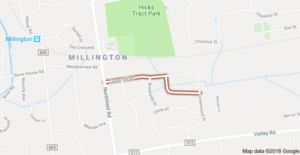 The Clover Hill Swimming Club was a swim club in the Millington section of Long Hill Township in Morris County, New Jersey. The club operated in the 1960s in the suburban New York City metropolitan region. The club first opened in 1963; members were required to buy a $350 debenture bond and pay an annual fee of $150. The club ranged over 170 acres, offering recreational facilities for lake swimming, tennis, skating and golfing.
The Clover Hill Swimming Club was a swim club in the Millington section of Long Hill Township in Morris County, New Jersey. The club operated in the 1960s in the suburban New York City metropolitan region. The club first opened in 1963; members were required to buy a $350 debenture bond and pay an annual fee of $150. The club ranged over 170 acres, offering recreational facilities for lake swimming, tennis, skating and golfing.
Court Case

In 1966, the Clover Hill Swimming Club was involved in a court case with Robert F. Goldsboro, an African American veterinarian.
The Grounds
In October 1963, Dr. Goldsboro claimed that he had been refused membership in Clover Hill because of his race. At the time of Goldsboro’s application to join the club, 250 families held membership with the maximum capacity of membership being 400 families. Goldsboro completed and sent his application to join the club, but upon not hearing back, called the club and was told that his application would be acted on unfavorably. Then, the club claimed that they had lost the application and sent him new forms.
After Goldsboro sent the second set of forms, the club rejected his request on the grounds that Goldsboro’s references did not know him socially. Bishop Rath, the leader of Goldsboro’s congregation, testified that he had received a call from the club to elaborate on the reference, to which Rath vouched for Goldsboro’s character. However, the club asked if Rath had known Goldsboro socially, “had dinner together and cocktails together and played cards together.” Two other members of Bishop Rath’s congregation were accepted into the club. In addition, other club member applicants testified that they had received personal interviews after submitting applications while Dr. Goldsboro had not.
Aftermath
The Clover Hill Swimming Club returned a statement that since they were a distinctly private facility and therefore exempt from coverage by the Law Against Discrimination. However, the court ruled the club to be a public accommodation because it advertised to the public. The court also ruled that any establishment declaring itself as a “club” cannot be an indication of being “distinctly private.” As a result, the Director of the Division on Civil Rights (Division) directed the club to admit Goldsboro, to delete from the application the request for information containing church activities, and to refrain from violating the Law Against Discrimination. The Clover Hill Swimming Club appealed this decision to the Supreme Court of New Jersey, where precedent was held.
Works Consulted
The Supreme Court of New Jersey. Clover Hill Swimming Club, Inc. v. Goldsboro. 4 Apr. 1966.
Justia US Law.
Wolcott, Victoria W.. Race, Riots, and Roller Coasters: the Struggle over Segregated Recreation in America.
